The recent death of Brian Thompson, the former CEO of UnitedHealthcare, has left a void in the leadership of one of the largest health insurance companies in the United States. His passing was deeply mourned by Andrew Witty, the CEO of UnitedHealth Group, who articulated the sorrow of losing a pivotal figure in a challenging industry. In a poignant opinion piece published in the New York Times, Witty addressed the systemic flaws prevalent within the U.S. healthcare framework, acknowledging a widespread sentiment among Americans—frustration over a system that appears cumbersome and ineffective.
Witty’s candid acknowledgment that the current healthcare system is a “patchwork built over decades” resonates with many who have faced the intricacies and, at times, the absurdities of seeking care. His assertion that “no one would design a system like the one we have” strikes a vital chord, establishing a foundation for the need for reform. It highlights a concept that transcends politics: healthcare is ultimately about providing quality service, and when that service is compromised, the entire system falters.
The Insurance Industry Under Fire
Thompson’s untimely death has sparked a renewed conversation about the role of health insurance companies in America. Criticism of the industry has reached a fever pitch with increasing stories circulating on social media related to denied claims, unexpected medical bills, and rising premiums. These narratives have painted a picture of an industry more concerned with profits than with patient outcomes. In Witty’s article, he acknowledges this anger and resentment, which has been building over years of dissatisfaction.
As UnitedHealth Group grapples with the aftermath of Thompson’s murder and the ensuing negative press, Witty emphasized the importance of the company’s mission—to collaborate with various stakeholders to enhance healthcare delivery. By welcoming partnerships not just from within the industry but from employers, government entities, and patients, the organization hopes to pave the way for more accessible and comprehensible healthcare solutions. This approach is critical in an environment where mistrust looms large.
The Path Forward: Clear Communication and Patient-Centered Care
Witty argues that one of the pressing needs of the insurance industry is to improve how coverage is explained and how decisions are made. This statement is foundational for any reform effort. Clear, transparent communication can help demystify the often perplexing nature of health insurance for patients, making it easier for them to navigate their care options. The emphasis on clinical evidence behind claims decisions is particularly significant; patients deserve to understand the rationale for coverage—or lack thereof—especially when it directly impacts their health outcomes.
Thompson, according to Witty, was a champion for patients, working tirelessly to assist them in navigating the complexities of the healthcare system. As the industry stands at a crossroads, the lessons drawn from both Thompson’s leadership and Witty’s reflections need to translate into actionable strategies for reform. By prioritizing patient-centric care and embracing transparency, the healthcare industry can begin to restore trust amongst consumers.
The tragic loss of Brian Thompson serves as a sobering reminder of the need for innovation and change in the healthcare sector. While grief has enveloped the organization, it also presents an opportunity—one that, if seized properly, could lead to a more equitable and efficient healthcare landscape for all Americans.

